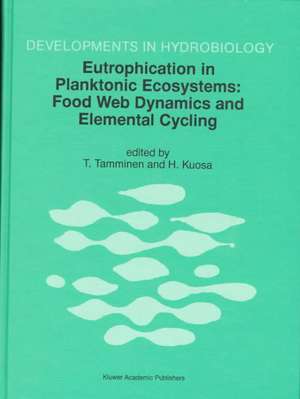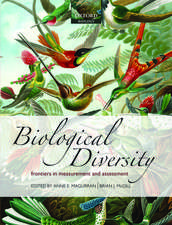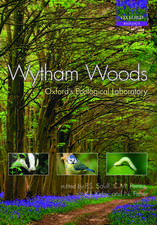Eutrophication in Planktonic Ecosystems: Food Web Dynamics and Elemental Cycling: Developments in Hydrobiology, cartea 127
Editat de T. Tamminen, H. Kuosaen Limba Engleză Hardback – 30 iun 1998
- Nutrient limitation of phytoplankton growth
- Nutrient cycles in the planktonic food web
- DOM sources, composition, and uptake
- Resource limitation vs. shaping of the food web by grazing
- Spatio-temporal variability: coupling of physical and biological processes
- Processes controlling sinking losses from the pelagic system
- Planktonic food web modelling
The book should be of interest to everybody involved in planktonic ecosystem research, from the advanced student to the distinguished scientist. This volume brings to the reader the expertise of internationally renowned authors on the main issues of today's ecological plankton research.
| Toate formatele și edițiile | Preț | Express |
|---|---|---|
| Paperback (1) | 957.62 lei 6-8 săpt. | |
| SPRINGER NETHERLANDS – 28 ian 2011 | 957.62 lei 6-8 săpt. | |
| Hardback (1) | 830.57 lei 38-44 zile | |
| SPRINGER NETHERLANDS – 30 iun 1998 | 830.57 lei 38-44 zile |
Din seria Developments in Hydrobiology
- 18%
 Preț: 1229.10 lei
Preț: 1229.10 lei - 18%
 Preț: 959.98 lei
Preț: 959.98 lei - 18%
 Preț: 963.91 lei
Preț: 963.91 lei - 15%
 Preț: 648.24 lei
Preț: 648.24 lei - 15%
 Preț: 637.89 lei
Preț: 637.89 lei -
 Preț: 378.25 lei
Preț: 378.25 lei - 15%
 Preț: 644.95 lei
Preț: 644.95 lei - 18%
 Preț: 952.09 lei
Preț: 952.09 lei - 20%
 Preț: 558.87 lei
Preț: 558.87 lei - 18%
 Preț: 1833.65 lei
Preț: 1833.65 lei -
 Preț: 393.59 lei
Preț: 393.59 lei -
 Preț: 406.54 lei
Preț: 406.54 lei - 18%
 Preț: 1226.73 lei
Preț: 1226.73 lei - 18%
 Preț: 956.99 lei
Preț: 956.99 lei -
 Preț: 388.87 lei
Preț: 388.87 lei - 24%
 Preț: 1060.53 lei
Preț: 1060.53 lei - 18%
 Preț: 1229.28 lei
Preț: 1229.28 lei - 20%
 Preț: 569.31 lei
Preț: 569.31 lei -
 Preț: 368.79 lei
Preț: 368.79 lei - 24%
 Preț: 817.48 lei
Preț: 817.48 lei - 18%
 Preț: 958.25 lei
Preț: 958.25 lei - 18%
 Preț: 953.03 lei
Preț: 953.03 lei -
 Preț: 384.75 lei
Preț: 384.75 lei - 24%
 Preț: 1582.95 lei
Preț: 1582.95 lei - 24%
 Preț: 1051.70 lei
Preț: 1051.70 lei - 18%
 Preț: 943.57 lei
Preț: 943.57 lei - 18%
 Preț: 1235.76 lei
Preț: 1235.76 lei - 24%
 Preț: 800.05 lei
Preț: 800.05 lei - 24%
 Preț: 803.57 lei
Preț: 803.57 lei - 18%
 Preț: 948.29 lei
Preț: 948.29 lei
Preț: 830.57 lei
Preț vechi: 1092.85 lei
-24% Nou
Puncte Express: 1246
Preț estimativ în valută:
158.98€ • 172.75$ • 133.63£
158.98€ • 172.75$ • 133.63£
Carte tipărită la comandă
Livrare economică 17-23 aprilie
Preluare comenzi: 021 569.72.76
Specificații
ISBN-13: 9780792351115
ISBN-10: 0792351118
Pagini: 344
Ilustrații: VIII, 344 p.
Dimensiuni: 210 x 297 x 25 mm
Ediția:Reprinted from HYDROBIOLOGIA, 1998
Editura: SPRINGER NETHERLANDS
Colecția Springer
Seria Developments in Hydrobiology
Locul publicării:Dordrecht, Netherlands
ISBN-10: 0792351118
Pagini: 344
Ilustrații: VIII, 344 p.
Dimensiuni: 210 x 297 x 25 mm
Ediția:Reprinted from HYDROBIOLOGIA, 1998
Editura: SPRINGER NETHERLANDS
Colecția Springer
Seria Developments in Hydrobiology
Locul publicării:Dordrecht, Netherlands
Public țintă
ResearchCuprins
Interactions of Top-Down and Bottom-Up Control in Planktonic Nitrogen Cycling; P.M. Glibert. Population Regulation and Role of Mesozooplankton in Shaping Marine Pelagic Food Webs; T. Kiørboe. Retention Versus Export Food Chains: Processes Controlling Sinking Loss from Marine Pelagic Systems; P. Wassmann. A Theoretical Approach to Structuring Mechanisms in the Pelagic Food Web; T.F. Thingstad. 30 Years Eutrophication in Shallow Brackish Waters - Lessons to be Learned; U. Schiewer. Relations Between Planktivorous Fish Abundance, Zooplankton and Phytoplankton in Three Lakes of Differing Productivity; J. Sarvala, et al. Planktonic Food Web in Marine Mesocosms in the Eastern Mediterranean: Bottom-Up or Top-Down Regulation? P. Pitta, et al. Coupling of Autotrophic and Heterotrophic Processes in an Estuarine Mixing Gradient (Pomeranian Bight, Southern Baltic Sea); G. Jost, F. Pollehne. Variability of Nutrient Limitation in the Archipelago Sea, SW Finland; T. Kirkkala, et al. Effects of Environmental Factors on the Phytoplankton Community in the Gulf of Finland - Unattended High Frequency Measurement and Multivariate Analyses; E. Rantajärvi, et al. On the Production, Elemental Composition (C, N, P) and Distribution of Photosynthetic Organic Matter in the Southern Black Sea; A. Yilmaz, et al. Elemental Composition of Seston and the Nutrient Dynamics in the Sea of Marmara; S.Ç. Polat, et al. Impact of Increased River Discharge on the Phytoplankton Community in the Outer Oslofjord, Norway; S. Kristiansen. Vertical Migration of Autotrophic Micro-Organisms During a Vernal Bloom at the Coastal Baltic Sea - Coexistence through Niche Separation; K. Olli, et al. Group-Specific Phytoplankton Biomass/Dissolved Carbohydrate Relationships in the Gulf ofTrieste (Northern Adriatic); S. Terzic,et al. The Use of Spectral Fluorescence Methods to Detect Changes in the Phytoplankton Community; J. Seppälä, M. Balode. The Budgets of Nitrogen and Phosphorus in Shallow Eutrophic Lake Võrtsjäarv (Estonia); P. Nõges, et al. Vertical and Seasonal Distributions of Micro-Organisms, Zooplankton and Phytoplankton in a Eutrophic Lake; A.-M. Ventelä, et al. Biochemical Composition of Particulate Organic Matter and Bacterial Dynamics at the Sediment Water Interface in a Mediterranean Seagrass System; R. Danovaro, et al. Development of Microbial Community During Skeletonema costatum Detritus Degradation; K. Künnis. Nutrient Composition, Microbial Biomass and Activity at the Air-Water Interface of Small Boreal Forest Lakes; U. Münster, et al. Seasonal and Spatial Distribution of Bacterial Production and Biomass Along a Salinity Gradient (Northern Adriatic Sea); A. Puddu, et al. Incorporation of Spatial Structure into the Analysis of Relationships Between Environment and Marine Microbiological Parameters; J. Truu, et al. Summer Biomass and Feeding Activity of Phagotrophic Mixotrophs in the Northwestern Black Sea; T. Bouvier, et al. Spatial Structure and Ecological Efficiency in the Summer Zooplankton of a Glacial Lake; G. Galkovskaya, V.V. Arapov. Nitrogen, Phosphorus and Daphnia Grazing in Controlling Phytoplankton Biomass and Composition &endash; An Experimental Study; H. Karjalainen, et al. In situ Grazing Rate and Diel Vertical Migration of Female Calanus euxinus in the Black Sea; S. Besiktepe, et al. Zooplankton-Phytoplankton Interactions: A Possible Explanation of the Seasonal Succession in the Kuršiu Marios Lagoon; Z.R. Gasiunaite, I. Olenina. Closing Address: Perspectives on Basic and Applied, Freshwate
Recenzii
`In summary, this book should be of interest to many researchers. Even though most contributions have a fundamental science background, it could be of use to water managers, and others working in the applied end of the scientific spectrum as well.'
Archiv für Hydrobiologie, 145:2 (1999)
`... the present book offers a valuable contribution to our understanding of planktonic ecology, and can be recommended for both the student and the `expert'. The four introductory chapters offer the general insight, and among the remaining case-studies and experiments there is something of interest for any scientist and manager in the field.'
Journal of Experimental Marine Biology and Ecology, 238 (1999)
Archiv für Hydrobiologie, 145:2 (1999)
`... the present book offers a valuable contribution to our understanding of planktonic ecology, and can be recommended for both the student and the `expert'. The four introductory chapters offer the general insight, and among the remaining case-studies and experiments there is something of interest for any scientist and manager in the field.'
Journal of Experimental Marine Biology and Ecology, 238 (1999)













